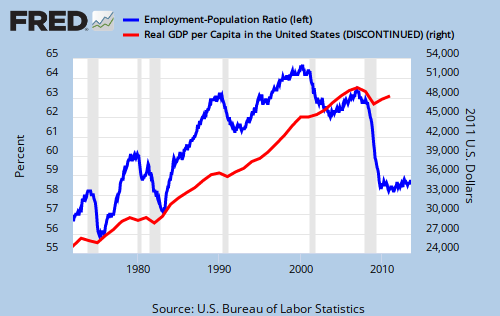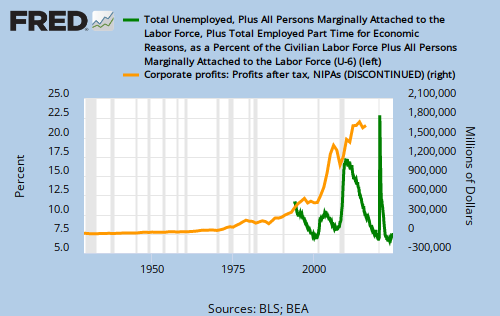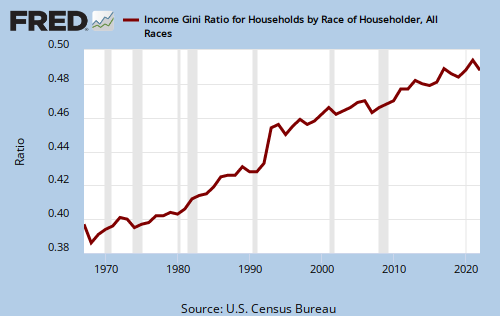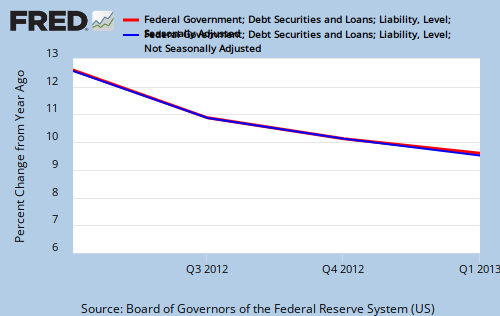Twitter: @rodgermitchell; Search #monetarysovereignty
Facebook: Rodger Malcolm Mitchell
Mitchell’s laws:
●The more federal budgets are cut and taxes increased, the weaker an economy becomes.
●Austerity is the government’s method for widening the gap between rich and poor, which ultimately leads to civil disorder.
●Until the 99% understand the need for federal deficits, the upper 1% will rule.
●To survive long term, a monetarily non-sovereign government must have a positive balance of payments.
●Those, who do not understand the differences between Monetary Sovereignty and monetary non-sovereignty, do not understand economics.
●The penalty for ignorance is slavery.
●Everything in economics devolves to motive.
======================================================================================================================================================================================
Long-term unemployment is a uniquely human phenomenon. No animals are unemployed, at least, not for long.
The job of a hawk is to eat mice, birds and other small creatures, and to rear little hawks. If the hawk doesn’t do his job, he starves to death, as do his kids. There are no long-term unemployed hawks. All hawks are self employed. No rich hawks benefit from the labors of poor hawks.
The job of a hippo is to eat grass, ward off crocodiles and raise little hippos. If hippos are long-term unemployed, they and their young die. Hippos too, are self employed. No rich hippos benefit from the work of poor hippos.
Now, some animals, cold-blooded especially, can laze without eating for many months, but even lazing is part of their job. It conserves energy.
For all animals, the goal is not work, but rather, survival, and not just survival, but comfort.
Which is why the whole notion of basing economic progress on human unemployment ratios, has become outmoded. People do not seek work. People seek survival and comfort, and it just happens that the way things have been arranged, work brings money, and money brings power, which enables survival and comfort.
But work, as we know it, is growing obsolete. Your great grandchildren may not work at all, or if they do work, their work will require few hours and little effort.
In January, 2012, this blog posted: “Again I lay my head on the MMT chopping block. Why JG (formerly ELR) is obsolete” in which I criticized one aspect of Modern Monetary Theory (a theory with which I mostly agree):
To create “full employment with price stability.” There is, in fact, a Center for Full Employment and Price Stability at the University of Missouri at Kansas City (UMKC), the heart of MMT in America.
The association of full employment with price stability is an important part of MMT. But while price stability (or at least, price control) is a worthwhile goal, full employment no longer is, and perhaps never was.
Technology, combined with Monetary Sovereignty, has taken us past that notion. Read from an article in NewScientist Magazine:
Future factories let workers build a car from home
04 September 2013 by Paul MarksMachines that can be controlled over the internet open up the possibility of factory workers joining the home-working revolution
The factories of the future will look very different from those today, with not a person in sight. Instead, workers will log into robot-assisted manufacturing “cells” to make what they want from the comfort of their own home.
You won’t even need to be employed by the factory: people on online social networks will be able to log in and set laser cutters and 3D printers to work, bashing out gadgets to order.
Say you want a car. You log on to a car-manufacturing website, build a car remotely, then automatically drive the car to your door — all without being “employed” in the usual sense.
How was the car factory built? Remotely, of course.
Admittedly, there is a chicken/egg consideration. Humans had to work to build the machines that built the machines that made this all possible. But once those machines are built, they could build other, even smarter, more talented machines, until human labor no longer is needed.
It already has begun:

In 1972, about 57% of the U.S. population was employed in outside-of-the-home jobs (blue line). As more women entered the labor force, by 2000, more than 64% of the population was employed. Today, less than 59% is employed.
But look at the increase in productivity (red line). It has gone up, up, up, with occasional dips for recessions. It isn’t people who are more productive; it’s machines.
Throughout human history, we have viewed ourselves as typical animals. “You don’t work; you don’t eat.” One of Aesop’s best known fables is the Ant and the Grasshopper. Hard work is extolled, while those who do not work are condemned.
Work not only has a practical purpose, but is a moral imperative.
The fable includes this counter-moral: Those who do not work deserve to suffer, earning neither pity nor charity.
For humans, however, the rich never have been expected to work. For them, there is no moral imperative. The rich always have been privileged. The poor not only are expected to work, but they are not considered deserving of assistance from the rich.
That moral is deeply embedded into the psyche of those who consider themselves conservatives. It is the self-serving, mean-spirited rationale for deficit reduction, which by its very nature, punishes the “have-nots” and benefits the “haves.”
The rich have promulgated the notion that hard work is the path to heaven, so as to maintain a ready supply of servants. If one doesn’t struggle and sweat for his masters, not only will he starve in this life, but he will burn in the next — except if he is rich, of course.
Today, among of the prime measures of a nation’s economic success (or failure) are the various unemployment ratios. The Fed talks of reducing its fake stimulus when one unemployment ratio reaches a certain, arbitrary level. And MMT’s stated goal is something called “full employment.”
But as productivity rises, employment becomes less economically meaningful. This reduced need to hire employees, combined with deficit reduction, creates a growing, more desperate servant class for the rich. As the demand for jobs grows, and the availability of jobs shrinks, the rewards for work can become more stingy.
We see it already. Real unemployment remains high while corporate profits have soared.

The servants work harder for less, and are punished for not finding work. It’s a perfect arrangement for the wealth class.
The point of the above is that we have been duped into seeking the wrong goal. The objective of humans should not be work, but rather, survival and comfort.
As productivity increases, the rewards should not be doled just to a shrinking minority, but to everyone. Legal working hours should be cut substantially from the traditional eight, minimum wages should be increased and social services (Medicare, Social Security et al) expanded.
Technology and Monetary Sovereignty together make it possible.
Yes, there always is the spurious argument, “What if nobody worked?” Actually, one day, that may come about, and we all may be happier for it. Until then, the measure of our economic success should not be employment, but rather, equality.
GINI is a measure of inequality. A GINI ratio of 0, would mean everyone earns the same. A GINI ratio of 1 would mean one person earned everything. As the line rises, enequality grows.

The goal of government should be to bring that line down. Our leaders should be judged by their success in reducing inequality.
Employment is not the goal; it is just the current means to the real goal of survival and comfort. Employment is a means that benefits the rich and enslaves the rest to a lifetime of labor.
It is cruel. It is unnecessarily. We need not be hawks nor hippos.
Rodger Malcolm Mitchell
Monetary Sovereignty
====================================================================================================================================================
Nine Steps to Prosperity:
1. Eliminate FICA (Click here)
2. Medicare — parts A, B & D plus long term nursing care — for everyone (Click here)
3. Send every American citizen an annual check for $5,000 or give every state $5,000 per capita (Click here)
4. Free education (including post-grad) for everyone. Click here
5. Salary for attending school (Click here)
6. Eliminate corporate taxes (Click here)
7. Increase the standard income tax deduction annually
8. Increase federal spending on the myriad initiatives that benefit America’s 99% (Click here)
9. Federal ownership of all banks (Click here)
10 Steps to Economic Misery: (Click here:)
1. Maintain or increase the FICA tax..
2. Spread the myth Social Security, Medicare and the U.S. government are insolvent.
3. Cut federal employment in the military, post office, other federal agencies.
4. Broaden the income tax base so more lower income people will pay.
5. Cut financial assistance to the states.
6. Spread the myth federal taxes pay for federal spending.
7. Allow banks to trade for their own accounts; save them when their investments go sour.
8. Never prosecute any banker for criminal activity.
9. Nominate arch conservatives to the Supreme Court.
10. Reduce the federal deficit and debt
No nation can tax itself into prosperity, nor grow without money growth. Monetary Sovereignty: Cutting federal deficits to grow the economy is like applying leeches to cure anemia.
Two key equations in economics:
1. Federal Deficits – Net Imports = Net Private Savings
2. Gross Domestic Product = Federal Spending + Private Investment and Consumption – Net Imports
THE RECESSION CLOCK


As the lines drop, we approach recession, which will be cured only when the lines rise.
#MONETARY SOVEREIGNTY
Great post, Rodger.
Honest studies consistently rank unemployment insurance as an effective policy for poverty reduction. Here’s one: http://www.fas.org/sgp/crs/misc/R41777.pdf
Unemployment insurance would be doubled if we lived in a knowledgeable country, because the unemployed are guaranteed to spend that money and thus stimulate the economy.
LikeLike
Medicare for everyone and Basic Income that’s unconditional.
This would eliminate the safety net bureaucracies.
Citizen dignity would be restored.
Business will have no health insurance cost.
Our economy would stabilize.
LikeLike
Right.
Poverty reduction is the last thing the rich want. Their primary goal is gap-widening.
The rich have hypnotized even the needy into self-loathing, so that the poor are supposed to feel embarrassed and unworthy of “handouts.”
Here is a very typical, cold-hearted, mean-spirited, ignorant, right-wing opinion: http://lonelyconservative.com/2013/06/20-year-illegal-immigrant-welfare-mama-tries-to-recruit-more-welfare-mamas/
The author describes herself as having a job (of course), but ironically, she says her blog is written “With a little help from my friends.”
(Presumably, friend help is O.K.; but government help is no good.)
LikeLike
Every man is or hopes to be an idler. I think Samuel Johnson said that. Excellent post Rodger.
People and especially conservatives have become cold hearted and infected with crab mentality. I was shocked to learn that many people have little to no empathy.
LikeLike
Great stuff, Rodger — as usual! But, how do our open borders factor into you’re thinking about wealth enhancement/self-actualization among our 99%. More the merrier? Your enunciated policies may well double/quintuple us within 10/15 years ……I’d sure head here!
LikeLike
For now, the more the merrier.
This is a huge country with vast amounts of space, and our population growth has slowed significantly. Generally, population growth is stimulative, because on average, each person contributes a bit more than he/she consumes (else we wouldn’t have had a growing GDP).
We probably could double our population before population growth became a negative. Don’t ask me for data. I have none. Just an observation that population growth and GDP growth seem to go hand-in-hand.
LikeLike
Rodger,
“Just an observation that population growth and GDP growth seem to go hand-in-hand.”
As they must, otherwise GDP per capita falls off a cliff. If you dont change the numerator along with the denominator, its not long before the ratio tumbles.
300 million people, $15 trillion GDP = $50,000 per capita GDP
350 million people $15 trillion GDP = ~$42,000 per capita GDP
Thats why, as you always note, a growing economy NEEDS a growing money supply.
LikeLike
“…minimum wages should be increased…”
can’t believe my eyes–especially so, since you were so dead-set against it this time last year:
https://mythfighter.com/2012/08/03/im-really-surprised-to-find-myself-disagreeing-with-marshall-auerback-about-minimum-wage/
and, as for the JG, i personally don’t see how we can possibly build the infrastructure that could lead to a “labor-free” society without it.
and, finally, i think that your criticism (here and in general) of your MMT friends is misplaced. they’re just simply trying to find a quick solution to long-term involuntary unemployment, which, of course, leads to poverty.
they’re not advocating for a fundamental change in society and i would argue that it would not be in their best interests to do so if they desire to maintain and/or increase their interaction with the mainstream public.
of course, i totally agree with you that, at the end of the day, people don’t really want a job, they (we) just want to be happy. and that means that we have to have a labor-free society where robots and computers do all the “grunt work.”
but, how do we get there from here? well, the absolute first step is to eliminate involuntary unemployment, as your MMT friends advocate.
why? b/c we need to do all the labor first, so as to eliminate the need for labor later.
LikeLike
Thanks Kim,
The past post you mention, which contained reasons for not increasing the minimum wage, contains the line: “Bottom line, minimum wage laws do have some benefit. They prevent employers from being too exploitative and paying desperate workers starvation wages.”
The line in the current post to which you refer is: “Legal working hours should be cut substantially from the traditional eight, minimum wages should be increased and social services (Medicare, Social Security et al) expanded.”
Given that in economics, every action for improvement also has some negative results, can you resolve the two, seemingly conflicting ideas? Think about it.
As for JG, it’s unworkable. (https://mythfighter.com/2012/05/29/why-modern-monetary-theorys-jobs-guarantee-is-like-the-eus-euro-a-beloved-solution-to-the-wrong-problem/)
In any event, I’ll be content with the “Nine Steps to Prosperity.”
LikeLike
i don’t have to resolve “the two, seemingly conflicting ideas” because it wasn’t i who made the 2 conflicting statements (albeit a year apart) in the 1st place.
i don’t want to rehash that whole JG discussion from last year, so i will just say, briefly, that i support the JG in part because it, if implemented correctly, could eliminate entirely the need for a minimum wage law–a law that you apparently used to be (and perhaps still are) conflicted about.
anyhow, apart from this small little point, i totally agree with everything else you say above.
LikeLike
Kim,
My opinion: Minimum wage should be increased if legal working hours are cut, substantially.
Circumstances alter cases.
As for JG being “implemented correctly,” if tigers could be tamed correctly, they’d make excellent sitters for your children.
LikeLike